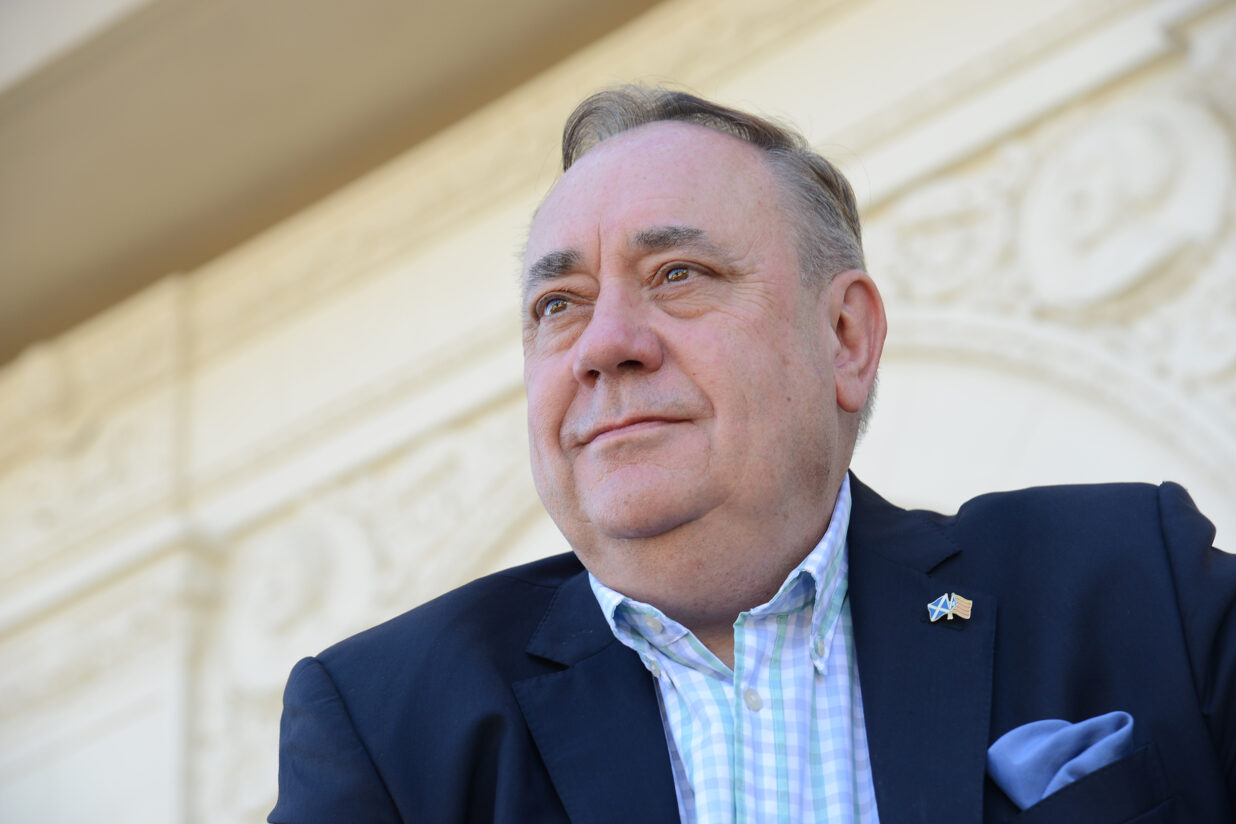18.09.2024 - 01:05
|
Actualització: 18.09.2024 - 01:07
Today, September 18, 2024, marks exactly ten years since Scotland’s independence referendum. The eyes of half the world were on First Minister Alex Salmond (1954) and the Scottish citizens who were voting on the future of the country. The “No” to independence won. However, the “Yes” vote reached 44.7%, even though in 2012 it was below 30%. Today, it is nearing 50%, according to polls. Catalonia and much of the world closely followed the result, the press was there, and international organizations, starting with Anna Arqué’s ICEC, sent observers. Today, ten years later, VilaWeb speaks with Alex Salmond, who is about to turn seventy, a living figure of Scottish nationalism, the man who forced the referendum in Westminster, lost it, resigned, and later returned with a new party, Alba. Few people like Salmond can explain what that referendum represented and what it represents now.
—Today we know where Scotland is after voting “No” to independence. Where would it be if it had voted “Yes”?
—Well, I’m actually doing a TV series about that. Scotland Speaks with Alex Salmond (YouTube). I’ve looked at the economy, politics, society, and experts agree that we would be better off than we are now. But that’s not saying much because the past ten years have been a depressing decline. If we had voted “Yes,” we wouldn’t be in a land of milk and honey, but we would be a land of oil, gas, and renewables, and that would have put us in a very good position.
—Why did you lose the referendum?
—When we started in 2012, support for independence was below 30%. Seeing that we got it up to 44% in the referendum was quite an achievement. Maybe we were starting from too far behind, and it was too big a leap. Saying we won the campaign but lost the referendum isn’t much consolation, but there’s some truth to it. And despite the SNP’s incompetence in government, support is at 50%. Fundamentally, Scottish independence is more likely now than before. Now we’re starting from a higher position, with greater support than the 2012 level, which was below 30%.
—Today, support is around 45%, and you started below 30%.
—We won’t argue about the polls. But the surveys say we’re neck and neck. The poll that gave us 45% didn’t exclude the “don’t know” responses. But the issue isn’t that. The issue is that the country is split in two, and the SNP has gone from disaster to disaster. They’ve lost the ability to govern well and competently. That’s a problem for the SNP but also for the independence movement. Someone might hesitate about independence because they don’t like the SNP’s stupidity. In these circumstances, I see the advantage of having more than one serious party supporting independence. It means people fed up with the SNP government can still vote for other pro-independence parties without having to switch to the unionists or Labour. In the current situation, it’s an advantage to have more than one party supporting independence.
—At this point, neither the parties nor the governments in London, nor judicial rulings are opening the door to a second referendum. Do you think it’s possible?
—That was one of Nicola Sturgeon’s many mistakes. Taking it to the Supreme Court was a kamikaze move—an incredible naivety and stupidity. As you know in Spain, as you Catalans know from experience, the supreme courts of states don’t tend to help those who want to dissolve the state. Thinking that was a smart step is almost irrational. You come to the conclusion that Nicola, during her years in government, wasn’t very grounded. There won’t be a referendum soon. So, you have to find opportunities in other elections. The Scottish Parliament elections are run under a system where, in the second vote, the regional vote, you can seek a mandate for independence. Because there, you can vote based on principles, unlike the first vote. So the “Yes” parties need to coordinate to send a common message and seek a mandate. Then go to Westminster with the democratic will of the Scottish people, with internal and international pressure. There are several ways to do it. The institutional weakness of the Westminster government is the greatest I’ve seen in my life. I’m convinced that with a sufficient majority, we can force Westminster to respect Scotland’s democratic rights.
—If I understand correctly, the idea is to turn a Scottish election into a referendum. Let’s say you do this and surpass 50%. You have a mandate. What would you do the next day?
—You mobilize the Scots. Then you can hold a referendum, not on independence, but on who should be the arbiter. Who should decide independence—the Scottish Parliament or Westminster? It would be a referendum on the powers of the parliament, and that is within the Scottish government’s remit. That’s just one example of what can be done institutionally to force Westminster. Catalan independence activists used to say, “If only the Spanish government acted like Westminster, so polite and democratic.” Well, it seems Westminster has learned more from the Spanish government than the Spanish government has from Westminster.
—What can Catalonia learn from Scotland. And Scotland from Catalonia?
—Catalonia’s movement has always impressed me greatly. For example, the fact that the movement went beyond the parties. Even though the Yes Movement in 2014 in Scotland was done very well, the structure and organization haven’t been maintained at the same level. I think that’s been a big mistake—folding the sails of the “Yes” campaign. What has impressed me about the Catalans is their approach to citizens and all the internal diversity.
—And what can Scotland learn from Catalonia?
—Politicians seeking independence for their country have the obligation to ensure they can deliver on their promises and make the path to independence credible. It has to be achievable. And that’s very difficult, I know. Don’t get me wrong. But you have to line everything up before making the move. Everything must be in place before you take the step. Before 2014, we had to force Westminster to grant us the referendum. Catalans might say, “Well, Westminster is full of nice, pleasant people.” If you believe that, you don’t know what Westminster is. They accepted the referendum because the alternatives to saying no were even less acceptable.
—In Scotland, at least the independence movement still holds power. Here, the independence movement has lost it.
—Well, you’ll have to regroup for the next opportunity. Institutions and parliaments are very important for the independence movement. And you have to govern well. In 2014, all sorts of terrible things were said about independence (that it would be a disaster, that the European Union wouldn’t accept us, that we would be marginalized, blah, blah, blah). But one thing they also said: even the unionists said that between 2007 and 2014, the SNP was the best at governing. As it was said at the time, we were irreproachable. One of the Conservative candidates said the SNP government from 2007 to 2014 was the best Scottish government in history. You have to emulate that because the message is powerful. But you have to govern effectively.
—“Independence is dead for at least a generation.” Said by the Scottish historian Thomas Devine.
—Thomas Devine is a top-tier historian, and people have a lot of respect for him. But he himself has often said that his department is the past, not the future. I think those are wise words. We should leave future predictions to politicians like me… Ha!
—Will we ever see reconciliation between Nicola Sturgeon and Alex Salmond?
—Never say never. But let’s note that Nicola will no longer be in politics. So, no problem there. The SNP has fallen from grace due to the foolishness of the last five years, and I could mention a few: self-identification as an act of faith. That’s religion, not what was expected of a national party. Even if you believe that transgender identity is the most important policy you have at hand, it’s not a policy that helps unite the nation toward independence. You can’t unite the country by dividing it. You don’t achieve independence by alienating the independence movement from women. It’s ridiculous! These are mistakes that need to be left behind. We need to hand it back to the adults. We need people who know how to lead. Scots may not agree on everything, but if they doubt competence and ability, well… And the last thing, most important for both Catalonia and Scotland: it’s like the old Coca-Cola ad. If we’re talking about independence supporters, you want the real deal. You want people who truly believe in it. Not people pretending to believe in it.
—What do you think of the Scottish Green Party, which also supports independence?
—My final answer was about them. The problem with the Green Party is that they adopted a pro-independence stance to gain votes. But the Greens are already speculating about forming a coalition with Labour after 2026. That’s not a truly pro-independence party.
—How come, despite Brexit, more people haven’t jumped on the “Yes” train for independence?
—There was a rise in support for “Yes” after the Brexit referendum. And at that moment, the SNP should have pushed harder for the common market. It seems to me that SNP politicians (not everything is Nicola Sturgeon’s fault) didn’t have the statecraft or political skill necessary to take advantage of the common market opportunity. Catalans should understand that in Northern Ireland, the majority party didn’t want the common market, and look where they ended up. In contrast, in Scotland, almost all parties (except the Conservatives) wanted to stay in the common market, and yet we’re out! How do you explain that if not due to political incompetence?
—Have you visited Carles Puigdemont or Pere Aragonès recently?
—Depends on what you mean by “recently.” I’ve seen them both on one occasion or another. But I haven’t been to Catalonia in the last two years, I’d say. I gave a talk at the Catalan Summer University, and your paper was there. That was the last time. Maybe I’ll visit you at the Champions League if Celtic ever plays Barça and scores a few goals against them.
—Good luck with that, because I’m not sure which is harder—Catalonia and Scotland’s independence or Celtic beating Barça…
—Scottish independence is easier than Celtic beating Barça. Although we did beat them years ago. We beat them.



